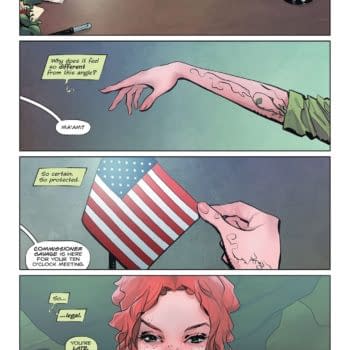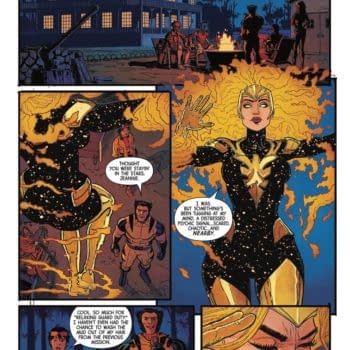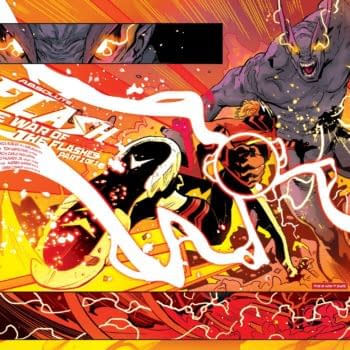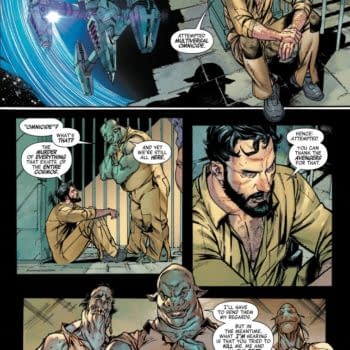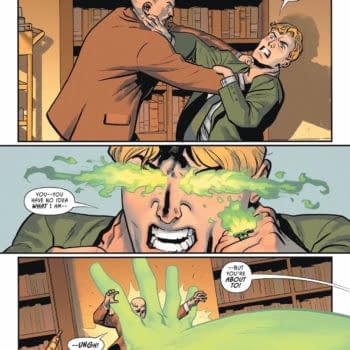Posted in: Comics, Recent Updates | Tagged: Comics, dc, dc comics, diversity in comics, entertainment, gendercrunching, marvel, Marvel Comics, women in comics
Gendercrunching February 2015 Including The Eisners – More Women Everywhere! But Wait…
By Tim Hanley
It was gains across the board in February, with both DC and Marvel showing some decent growth in overall female creator representation. Then we take a look at this year's Eisner award nominations, where the number of female creators nominated increased from last year. More women everywhere! What a rare and pleasantly upbeat column this should be.
DC COMICS
Strong creative numbers led to a solid month for DC Comics, and a sizeable gain from their January total. In February 2015, DC released 87 new comics featuring 810 credited creators, 710 men and 100 women. Here are their stats:
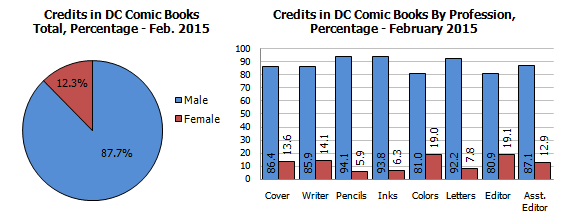
Compared to a Year Ago: DC had 13.8% female creators last February, so they're down 1.5% since then.
MARVEL COMICS
Marvel ticked up as well, also led by a strong showing on the creative side of the chart, though they remain far below past highs overall. In February 2015, Marvel put out 75 new comic books with 600 credited creators, 544 men and 56 women. Let's look at the numbers:
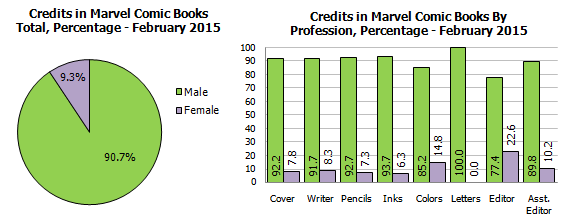
Compared to a Year Ago: In February 2014, Marvel had 12% female creators overall, so they're down 2.7% since then.
THE 2015 EISNER AWARDS
Ah, the Eisner Awards. A glamorous and star-studded evening where the comic book industry honors its best and brightest. It's the Oscars of comics, except way less fancy and without the hundreds of millions of people watching across the world. There are lots of other comic book awards out there, but the Eisners are as big as it gets for the funny books.
When we looked at the Eisners last year, the number of female creators had grown significantly, and the total has ticked up slightly higher this year. Before we get to the chart, first a quick note on methodology. For this count, I count every nominee listed, and they get counted multiple times if they receive multiple nominations. So Brian K. Vaughan gets counted four times, Noelle Stevenson gets counted three times, that sort of thing.
Let's take a look at the chart, showing this year and every other year for the past decade:
While a 1.1% gain from last year isn't massive, it's a gain nonetheless, and 19% female creators is much more than we're used to seeing from most comic publishers' general output. Going strictly by the numbers instead of percentages, there were 44 nominations for women in 2015, up from 40 in 2014.
Representation remains strong across the board as well, though very slightly less so. Women were nominated in 21 of the 29 categories, just down from 22 in 30 categories last year (it seems they've dropped the "Best Adaptation from Another Medium" award this year). All together, women were nominated in nearly 75% of this year's categories, a far cry from years past when they'd just be relegated to a few categories, often from publishers outside of the North American direct market. Women are making every sort of comic book in every sort of job for every sort of publisher these days, and getting lots of nominations for doing so.
When we looked at the Eisners last year, I ended with a comparison to the Hugo award nominees, which get announced around the same time each year. It was a bit of a buzzkill, because while 17.9% female creators was a great number for the Eisners, our sci-fi nerd cousins at the Hugos more than doubled that with 40.2% female nominees in 2014. Things are much different this year, and the 2015 Hugo nominations are mired in a bizarre controversy where a handful of conservative writers and their rabid fans hijacked the nomination process to ensure that poor, marginalized white men finally got the recognition they deserved. It's all quite ridiculous, and may tarnish the legacy of the Hugos for years to come.
Not at all surprisingly, this campaign from right wing conservatives has lowered the number of female nominees substantially. Only 22.7% of the 2015 Hugo nominees are women, just over half of last year's total. It's an appalling decline, and the controversy is still raging on. Also, it's still a higher percentage of nominated women than the Eisners. Even with a bunch of wingnuts hijacking the awards, the Hugos still have more women in the mix. It's a bit of a stinging indictment of the comic book industry. While the rise of female creators is definitely progress, there's still a long way to go yet.
To learn more about this statistics project and its methodology click here, and to see the previous stats click here. You can visit Tim at Straitened Circumstances and follow him on Twitter @timhanley01. His book Wonder Woman Unbound: The Curious History of the World's Most Famous Heroine is available now.











